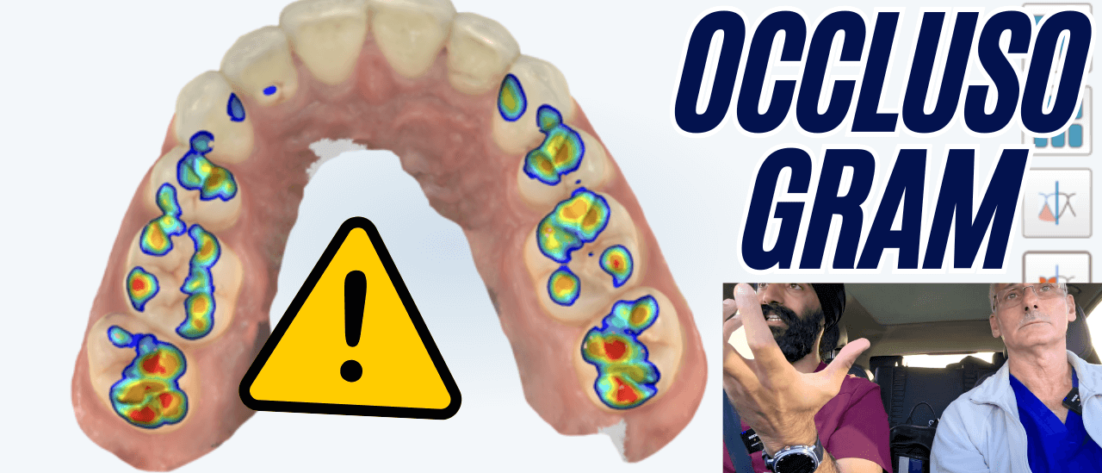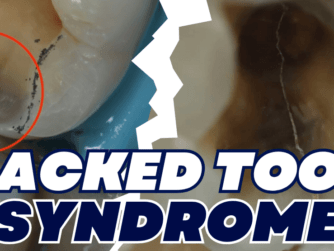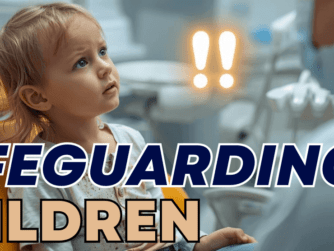Podcast: Play in new window | Download (Duration: 43:09 — 60.2MB)
Subscribe: RSS
Ever had a patient swear their bite feels “off” – even though the articulating paper marks look perfect and you’ve adjusted everything twice over? Or maybe you’ve placed a beautiful quadrant of onlays, only to have them return saying, “these three teeth still feel proud.” If that sounds familiar, you’re not alone.
In this episode, I’m joined (in my car, no less!) by Dr. Robert Kerstein, who was back in the UK to teach about digital occlusion and the power of the T-Scan and ‘disclusion time reduction therapy’. We dig into why a patient’s bite can still feel “off” even when everything looks right, how timing is just as important as force, and why splints and Botox don’t always solve TMD.
Robert explains why micro-occlusion is the real game-changer, how scanners could mislead you, and why dentistry still clings to articulating paper.
So if you’ve ever wondered why “perfect” cases still come back with bite complaints, or whether timing data can actually prevent fractures and headaches, this episode will give you plenty to chew on – pun intended.
Need to Read it? Check out the Full Episode Transcript below!
Key Takeaways:
- Micro-occlusion, not just “dots and lines,” is the real driver of patient comfort and long-term tooth health.
- T-Scan measures both force and timing, which scanners and articulating paper cannot capture.
- Many patients show signs of occlusal damage without symptoms.
- Disclusion Time Reduction (DTR) treats TMD neurologically without splints, Botox, or TENS.
- Relying on occlusograms alone for guiding reduction is risky.
- Dentists can reduce post-treatment complaints by balancing micro-occlusion with T-Scan.
- Adopting T-Scan requires proper training.
- CR can be a convenient reference point, but MIP works well in most cases if micro-occlusion is managed.
- Objective, repeatable data builds patient trust and provides medico-legal reassurance.
Highlights of this episode:
- 00:00 Teaser
- 01:13 Intro
- 4:41 Protrusive Dental Pearl – Removing a Temporarily Cemented Crown
- 06:39 Introduction
- 08:48 Global Training Footprint
- 09:32 What Robert Teaches (DTR & T-Scan)
- 09:55 Occlusion as Neurologic
- 10:33 Macro vs Micro-Occlusion
- 11:33 Neural Pathway
- 15:00 MIP vs CR Framing
- 16:48 Signs Without Symptoms
- 19:16 Silent Majority
- 20:08 Why Treat Asymptomatic Signs
- 20:50 Disclusion and MIP
- 22:28 Occlusogram Caveats
- 24:53 Midroll
- 28:14 Occlusogram Caveats
- 28:29 Why Occlusograms Mislead
- 29:21 Don’t Adjust From Color Alone
- 31:47 What Pressure/Timing Enable Clinically
- 33:02 Prosthetic Reality Check
- 34:46 Patient-Perceived Comfort
- 35:29 Why Isn’t T-Scan Everywhere?
- 36:29 Political Resistance
- 37:42 CR as Utility
- 38:18 MIP and Vertical Dimension.
- 39:48 Macro ≠ Micro
- 41:00 Material Longevity Benefits
- 41:57 T-Scan Training
- 42:58 Three Competencies to Master
- 44:20 Micro-Occlusion Rules
- 44:46 Outro
If you want to get more clued up on TMD, tune into this episode for the latest insights and guidelines! PDP213 – TMD New Guidelines – however be warned that the guidelines are contradictory to what Dr. Kerstein advises….ah the wonderful world of TMD!
#OcclusionTMDandSplints #OrthoRestorative
This episode is eligible for 0.5 CE credit via the quiz on Protrusive Guidance.
This episode meets GDC Outcomes A, C.
AGD Subject Code: 250 – Clinical Dentistry (Occlusion/Restorative)
Aim: to explore the role of micro-occlusion and timing in TMD and restorative success, highlighting how tools like T-Scan provide data that other tools cannot. This episode seeks to give dentists practical insights into diagnosing, preventing, and treating occlusal problems with greater accuracy.
Dentists will be able to:
- Describe the role of micro-occlusion and disclusion time in TMD symptoms and tooth wear.
- Recognising the limitations of traditional methods of occlusion adjustment.
- Understand how objective occlusion data supports comfort, longevity of restorations, and preventive care.







